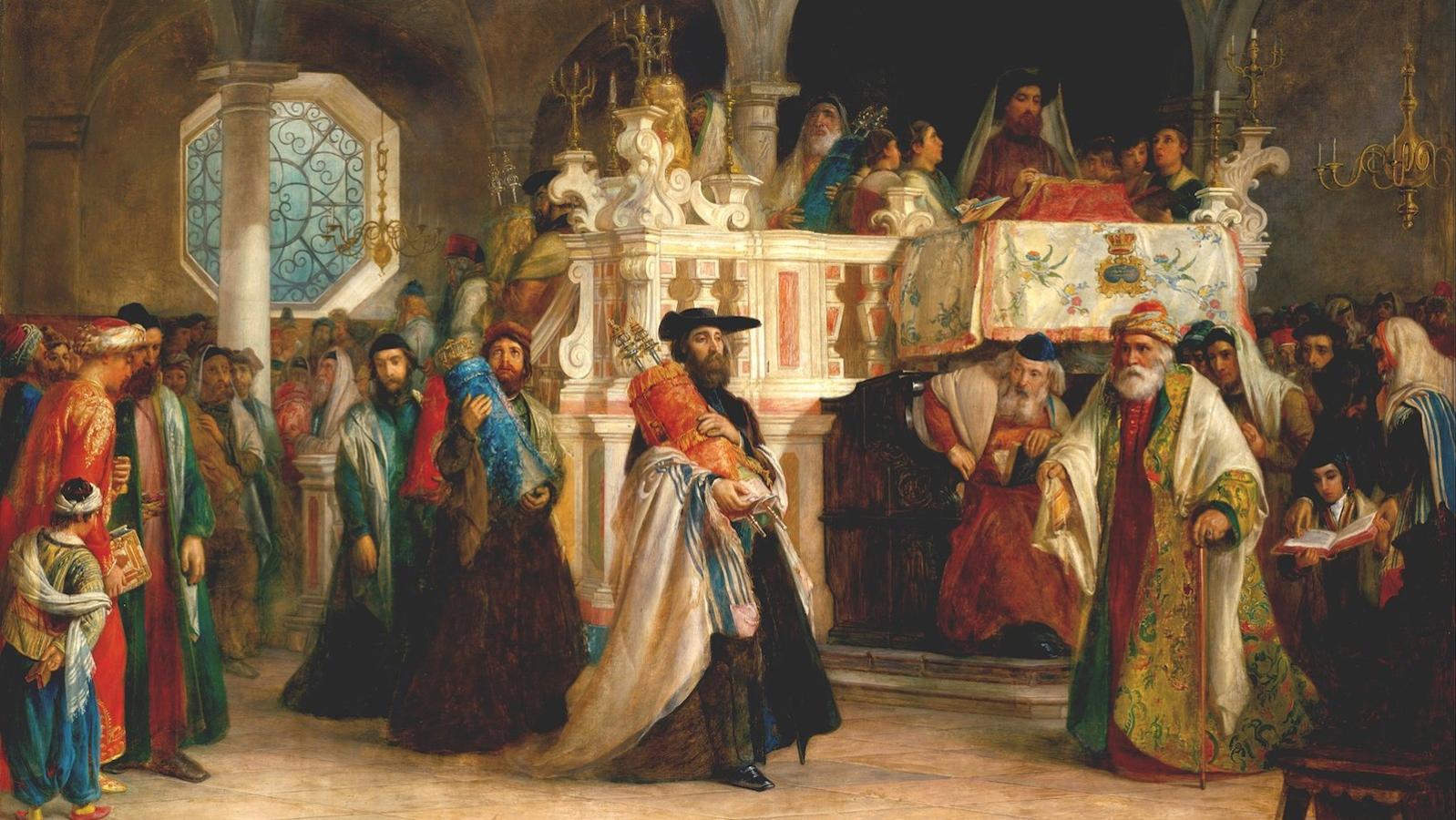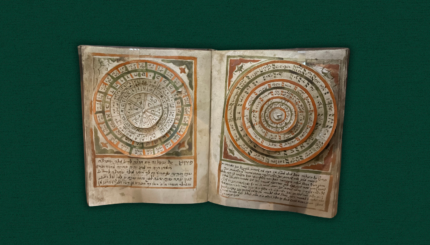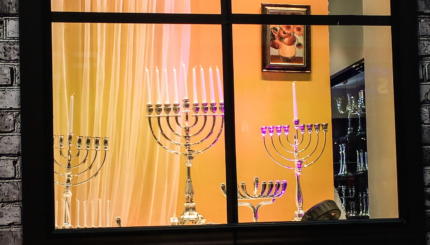The status of Shemini Atzeret can be confusing at first glance. Its name means the “eighth day of assembly” — which would imply that it somehow belongs to the seven-day holiday that immediately precedes it, Sukkot. It is true that Shemini Atzeret is related to Sukkot, but its independence as a holiday is well established in the Talmud.
In Numbers 29:35 we learn that “On the eighth day you should hold a solemn gathering; you shall not work at your occupation.” This verse does not connect the eighth day specifically to any of the other traditions associated with Sukkot, begging the question: Is this its own distinct holiday or part of Sukkot? This confusion led to much debate over whether one should, for example, say Kiddush (the prayer of sanctification, recited over wine on holy days) in the sukkah on this day a custom followed by some, or whether Shemini Atzeret should warrant its own liturgical additions. [The fact that some have the custom to sit in the sukkah on Shemini Atzeret is based on the uncertainty surrounding yom tov sheni shel galuyot, that is, one would sit in the sukkah just in case Shemini Atzeret really is the seventh day of Sukkot.]
In his book The Jewish Holidays, Michael Strassfeld points out that Shemini Atzeret in many respects parallels Shavuot, which can be viewed as the long-distance conclusion to the seven-day holiday of Passover, coming as it does seven weeks after Passover. At that time of year, the weather would be clear enough to have people come back to Jerusalem for an additional pilgrimage some weeks later. Sukkot, however, marks the beginning of the rainy season, and since it would be difficult to ask people to make an additional trip to Jerusalem, Shemini Atzeret would best be placed immediately following Sukkot. [In the Talmud, Shavuot is called “Atzeret” making the parallel with Shemini Atzeret even stronger.]
Shemini Atzeret is a two-day festival in traditional Diaspora communities and a one-day holiday in Israel and in many liberal Diaspora communities, as with many other Jewish holidays. The only ritual that is unique to Shemini Atzeret is the prayer for rain (tefilat geshem), and this prayer is parallel to the prayer for dew which is recited on Passover. These two holidays serve as the bookends of the agricultural season, at the beginning and end of the rainy season. Whereas the Torah does describe the offering that was brought to the Temple on Shemini Atzeret, once the Temple was destroyed, there was nothing that remained from the holiday’s ritual except the liturgy requesting rain for a bountiful year.
With your help, My Jewish Learning can provide endless opportunities for learning, connection and discovery.
In the early Middle Ages, Shemini Atzeret began to be associated with the ritual of completing the yearly cycle of readings from the Torah, leading to the later development of Simchat Torah from what was likely the second day of Shemini Atzeret. Simchat Torah developed into the day on which we celebrate the ending of one cycle of Torah reading and the beginning of the next cycle.
Among traditional Diaspora communities, Simchat Torah is congruent with the second day of Shemini Atzeret, and in Israel and liberal Diaspora communities, it coincides with the single day of Shemini Atzeret. It is a joyous holiday with a relatively young history, since it is not mentioned in the Torah. It is traditionally the only time when the Torah is read at night, when we read the last section from Deuteronomy, to be followed the next day by the conclusion of Deuteronomy and the beginning of Genesis. There is a tradition on Simchat Torah morning of calling all members of the community to say the blessing over the Torah, known as an aliyah, and synagogues will often repeat the reading until all members have had their aliyot (plural) or split into smaller groups to chant the reading from several different Torah scrolls simultaneously, so everyone can have this honor.
Similar to Sukkot, there are several (three, or more commonly, seven depending on the custom of the synagogue) circuits around the synagogue on Simchat Torah. These are known as hakafot (singular: hakafah). In distinction to the hakafot on Sukkot, they are done holding the Torah, not the lulav and etrog. They are accompanied by joyous dancing that often spills onto the street outside.
In Kabbalah (the mystical tradition) the seven hakafot on Simhat Torah became a kind of unification of the seven days of Sukkot and also representative of the seven sephirot (emanations of God). This spiritual and mystical understanding of Simchat Torah accords with the very physical tradition of turning the hakafot into joyous dancing. The Torah reading that follows the wild dancing is often very playful and humorous, as it is a celebration of the great gift of God’s Torah.
In recent times, Simchat Torah has also become a very “child-friendly” holiday. Many synagogues invite all the children up for a group aliyah and give out flags for the children to march around with during their own hakafah.
While Simchat Torah’s origins are not specifically biblical, it has become a Bible-centered holiday on which the hearts of Jews are drawn to celebrate the Torah.
Kabbalah
Pronounced: kah-bah-LAH, sometimes kuh-BAHL-uh, Origin: Hebrew, Jewish mysticism.
lulav
Pronounced: LOO-lahv (oo as in boo), Origin: Hebrew, a bundle of branches representing three species -- willow, myrtle and palm -- which are shaken together with the etrog on Sukkot.
Shavuot
Pronounced: shah-voo-OTE (oo as in boot), also shah-VOO-us, Origin: Hebrew, the holiday celebrating the giving of the Torah at Mount Sinai, falls in the Hebrew month Sivan, which usually coincides with May or June.
sukkah
Pronounced: SOO-kah (oo as in book) or sue-KAH, Origin: Hebrew, the temporary hut built during the Harvest holiday of Sukkot.
Sukkot
Pronounced: sue-KOTE, or SOOH-kuss (oo as in book), Origin: Hebrew, a harvest festival in which Jews eat inside temporary huts, falls in the Jewish month of Tishrei, which usually coincides with September or October.
Torah
Pronunced: TORE-uh, Origin: Hebrew, the Five Books of Moses.
Kiddush
Pronounced: KID-ush, Origin: Hebrew, literally holiness, the blessing said over wine or grape juice to sanctify Shabbat and holiday.



